Aristophanes and Classical Greek Comedy
Overview
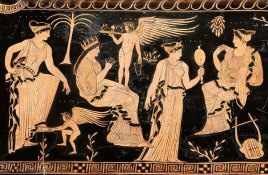 Performers in classical Greek comedies, had to be skilled, both
orally and physically. The structure of the theaters caused some members of the
audience to have an obscured view of the performance. Consequently, performers
had to employ vocal techniques to convey their mood or emotions and they often
over-emphasized actions in order to allow all responders to be able to
appreciate the spectacle and humor. Actors utilized many dramatic techniques
such as tone, accent, impersonation, body language and slapstick in order to
denote the playwrights ideas, maintain the focus of the audience and create
humor. Performers in classical Greek comedies, had to be skilled, both
orally and physically. The structure of the theaters caused some members of the
audience to have an obscured view of the performance. Consequently, performers
had to employ vocal techniques to convey their mood or emotions and they often
over-emphasized actions in order to allow all responders to be able to
appreciate the spectacle and humor. Actors utilized many dramatic techniques
such as tone, accent, impersonation, body language and slapstick in order to
denote the playwrights ideas, maintain the focus of the audience and create
humor.
Layout of the theater
The architecture and seating structure of a classical
Grecian theater shaped the way in which the actors performed, requiring more
vocal and physical skills. Ancient Greek theaters were large, alfresco
structures and were comprised of three main parts. At the core of the theater
was the orchestra, a large annular area of approximately 150 meters in diameter
and the “dancing place” of the chorus. The orchestra was employed as a focal
point of theater as a considerable amount of action occurred there in addition
to the religious rites and choral performances that were conducted in the area.

The individuals in the chorus had to utilize over-expressive motions and speak
or chant loudly to be heard over the musical accompaniment. Behind the orchestra
circle was the skene. A covered structure deployed by actors to store costumes
and to function as an additional performance area as the entertainers could
appear on the roof of the skene or be wheeled through the stage doors on an
ekkyklema. The audience were seated in the theatron on tiered benches, arranged
in a semi-circle around the orchestra and often constructed into the side of a
hill. The archetypal theater building was extremely large and able to seat
between 12, 000 and 15, 000 viewers. Due to the structure of the theatron, the
performers would have appeared minuscule to the responders and those at the back
of the theater would not have been able to discern what the actors were doing.
Therefore, performers were required to exaggerate their movements whilst wearing
extremely outrageous costumes in order for the entire audience to perceive the
emotions and comedic elements that they were trying to portray. Despite the
obstruction to the responders view of the play, the acoustics within the theater
were extremely well developed and the whisper of an actor could be distinguished
from even the furthest seats.
Cast of Aristophanes and Menander
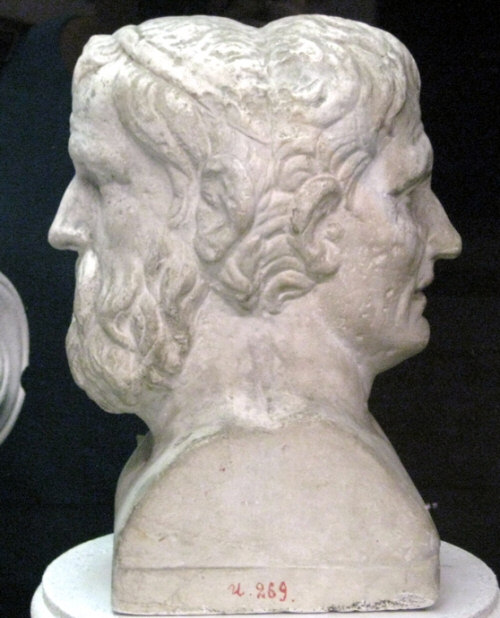
By shakko
via Wikimedia Commons
Thus, the structure of classical theaters had a
significant impact on the way that an Aristophanic comedy was performed and
demanded various skills from the performers in order to better communicate the
message and humor.
Skilled actors
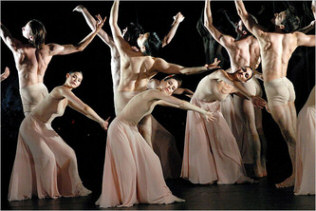 Verbal skills were essential in the plays of Aristophanes to
convey significant messages and issues as well as comedy to the responders.
Performers used verbal skill to portray emotion, create humour and maintain the
attention of the viewers. The actors manipulated the tone of their voice in
order to denote their sentiments towards a particular issue, their mental and
emotional state and as well as their actions. “[In mock adoration]: O mighty
hero Lamachus! What crests, what cohorts!” (l.575-576. The Acharnians.
Aristophanes.) A performer in the role of Dikaiopolis would have employed tone
in order to convey his contempt for Lamachus. His obviously false admiration is
an archetypal illustration of the effect of humor and wit within the play that
conveys his disdain for the war and those that support it. In addition, actors
utilized accents to delineate their heritage or nationality and to impersonate
unpopular individuals, especially those of a political nature. “Ar, boi
Heracles, this shoulder o’ moine be sore.” (l.860-861. Peace. Aristophanes) The
Theban who comes to trade with Dikaiopolis would be recognized as a non-Athenian
by his manner, costume, mask and accent. Therefore, actors had to be adept at
performing with various accents in order to realistically portray the area of
origin of a certain individual. Further, the chorus had to perform long sections
of rhythmic chanting and singing. These sections of Aristophanes’ plays
epitomized his comedic prowess and allowed the audience an additional chance to
experience spectacle and humor. Consequently, the chorus had to be relatively
adept at singing and maintaining a rhythmic pace whilst chanting. Therefore, a
great amount of vocal skill was crucial in the plays of Aristophanes. Verbal skills were essential in the plays of Aristophanes to
convey significant messages and issues as well as comedy to the responders.
Performers used verbal skill to portray emotion, create humour and maintain the
attention of the viewers. The actors manipulated the tone of their voice in
order to denote their sentiments towards a particular issue, their mental and
emotional state and as well as their actions. “[In mock adoration]: O mighty
hero Lamachus! What crests, what cohorts!” (l.575-576. The Acharnians.
Aristophanes.) A performer in the role of Dikaiopolis would have employed tone
in order to convey his contempt for Lamachus. His obviously false admiration is
an archetypal illustration of the effect of humor and wit within the play that
conveys his disdain for the war and those that support it. In addition, actors
utilized accents to delineate their heritage or nationality and to impersonate
unpopular individuals, especially those of a political nature. “Ar, boi
Heracles, this shoulder o’ moine be sore.” (l.860-861. Peace. Aristophanes) The
Theban who comes to trade with Dikaiopolis would be recognized as a non-Athenian
by his manner, costume, mask and accent. Therefore, actors had to be adept at
performing with various accents in order to realistically portray the area of
origin of a certain individual. Further, the chorus had to perform long sections
of rhythmic chanting and singing. These sections of Aristophanes’ plays
epitomized his comedic prowess and allowed the audience an additional chance to
experience spectacle and humor. Consequently, the chorus had to be relatively
adept at singing and maintaining a rhythmic pace whilst chanting. Therefore, a
great amount of vocal skill was crucial in the plays of Aristophanes.
Gestures and physical movement were compulsory elements of Aristophanic
theater. The performers in the comedies were expected to dramatize each action
so that all viewers could discern their actions and appreciate the humor.
Impersonation was a significant element in the Aristophanes’ plays as the actors
attempted to convey the flaws of disliked political leaders and famous
individuals in a humorous manner. “[Enter, as fast as they can (which is not all
that fast), the chorus of Acharnians, very old and very ferocious men.] Leader:
Chase him, chase him everybody, for the traitor must be found.” Here, the
chorus, which consisted of young to middle aged men, were required to
impersonate a group of elderly men. This demanded a significant amount of skill
as they had to portray a rabble of angry and aged Acharnian men, chasing after
Amphitheus. They would have worn masks and costumes to depict their age but the
appropriate movements were essential in the scene to allow the entirety of the
audience to know who they were and their age as well as to add a comedic
element. Body language was also extremely important in this form of theatre.
“Though [coming close to [Lamachus]; in a seductive voice] if you are so strong,
why don’t you give me a bit of a thrill.” The sexual insinuations created by
Dikaiopolis’ tone of voice, combined with his gestures, add to the comedy of the
situation and his antipathy to Lamachus. All responders would have been able to
appreciate both the vocal and physical skills espoused by the actors and would
be able to comprehend the intended innuendo. Thus, both physical and verbal
skills were essential in performances Aristophanic plays.
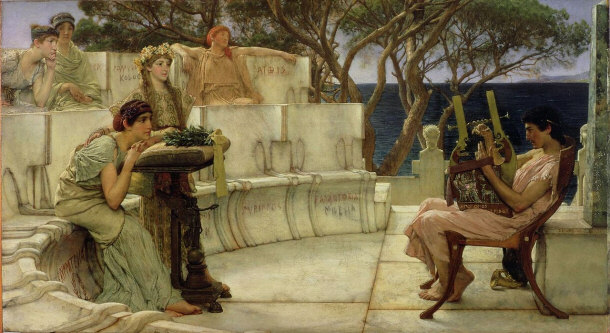
Due to the innate complexity and brilliance of the comedy in the plays of
classical Greece, actors were required to have a great ability to employ both
oral and gestural factors in their performances. They had to utilize vocal
skills in order to convey humor within their impersonations, chanting, wit and
other comedic elements. In addition, performers used various physical skills to
better parody unpopular contemporary figures and exaggerate movement so that all
viewers could comprehend the humor and messages within the play.
Aristophanes and Athens
Aristophanes’ comedies, although often exaggerated to
create humor, are extremely successful in helping people learn about life in
ancient Athens. He satirizes and parodies politicians and other important
figures and therefore gives the reader an understanding of ancient Athenian
politics and society. Although Aristophanic comedies are an excellent source of
information about his contemporary society and the views of a number of
citizens, the information must be selected carefully and not everything should
be taken literally in order to ensure that the reader absorbs the correct
information from the text. Comedies tend to be over-exaggerated in order to
heighten humor and thus information must be considered carefully before being
taken as fact. Further, it is necessary for the reader to have some previous
knowledge about ancient Athenian customs, politics and society in order to fully
comprehend all of the jokes and gain further insight into these areas.
Bazaar of Ancient Athens

Aristophanes reveals facts about the politicians and demagogues of ancient
Athens through his parodying and mocking of them throughout his comedies.
Aristophanes particularly focuses on the demagogue, Cleon, who was a strategist
during the Peloponnesian war. The comic poet generally chose to present him in a
negative light, as a war-mongerer, a notion which is often complemented by
Thucydides’ recounts and reconstructions of his speeches and actions. The
Knights is an Aristophanic comedy almost entirely devoted to satirizing Cleon’s
personality and deeds and conveys, through humor, the poet’s view of the
demagogue and the view of a number of Athenian citizens. This can be revealed as
the view of a number of citizens as the audience would have had to enjoyed the
mocking of Cleon for it to win first prize in the Lenaea in 424 BCE.
Aristophanes mocks Cleon’s humble background as a tanner throughout the play,
making continuous jokes at his expense. The numerous references to “hide”,
“stitching” and “leather-purses” fully exploit the demagogue’s origins and give
readers insight into the value that was placed on socio-economic status in
ancient Athenian society. Further, his loud and obnoxious nature is highlighted
throughout the play. He is called “a robber and a shrieker, with a voice like an
overloaded sewer” as well as a “villainous swine”. He is revealed to be a proud
person and persuasive yet dishonest speaker who would use any means to obtain
his objective. He is denoted to attempt to achieve each of his goals by
flattering Thepeople (Demos) with gifts and lies, just as he tries to deceive
the people of Athens. He is almost always portrayed in a negative way by
Aristophanes who, it can be assumed, represented the people’s opinions through
his plays. Further, Cleonymous notoriety as a glutton and a coward in battle can
be seen via Aristophanes’ excellent presentation and sat of his weakness.
Cleonymous dropped his shield in battle in 424 BCE, leaving the men around him
unprotected and thus, vulnerable to attack by the enemy. His innate fear and
weakness in the midst of fighting is mocked in Peace as he is called a
“castaway” by Trygaeus to comically reveal that he cast away his shield.
Subsequent to this he became renowned as a coward as well as for his gluttonous
nature, two facts which are continuously exploited as a source of humor in
Aristophanes’ plays. Similarly, Lamachus is ridiculed in both Peace and
Acharnians as a pompous and overbearing. Therefore, the plays of Aristophanes
are useful to the readers in gaining information about politicians in ancient
Athens.
Academy of Athens
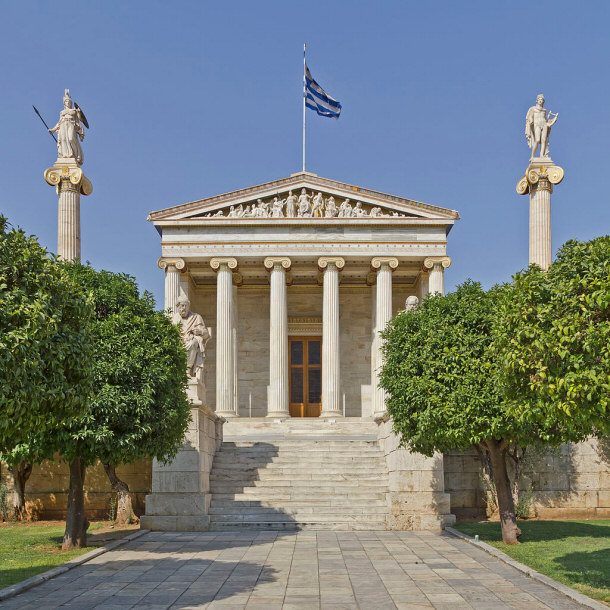
By A. Savin
via Wikimedia Commons
Aristophanes often parodies his fellow poets, allowing readers of his
comedies to further comprehend information about the arts in ancient Athenian
society. In the majority of his plays, Aristophanes parodies the renowned
tragedian, Euripides in order to heighten the humor in his comedies. In The
Acharnians, Euripides is mocked for his continuous use of injured or crippled
men as heroes in his plays. He is portrayed as a weak individual who is perhaps
crippled himself and has to be wheeled out by his servant onto the ekkyklema.
Aristophanes ridicules Euripides through the character of Dikaiopolis who notes
that he has “renounced the use of [his] legs” and wears “tragic rags”. He
exclaims that it is “no wonder [he] create[s] beggars” as the heroes of his
tragedies. Further, Euripides’ famous play, Bellerophon is satirized in Peace as
Trygaeus attempts to ride to Olympus, not on a winged horse, but on a dung
beetle. The dung beetle is compared to the horse that Bellerophon attempted to
ride to Olympus in a famous Greek myth, as a servant describes Trygaeus’
treatment of it. “He rubbed the creature down like a thoroughbred colt and he
said to it, ‘Well, my little Pegasus, my noble winged steed, soon you’ll be
flying up to to Zeus with me on your back.’” Numerous times throughout most of
Aristophanes’ plays, characters quote and parody Euripidean tragedies, making
them comic and ridiculing the poet. In contrast, in Peace, lines from Homer’s
Illiad are quoted and adapted, yet Aristophanes does not mock it but shows a
form of reverence for the skill of the ancient epic poet. These adaptations and
parodies lead readers to understand which dramas and works of literature would
have been prominent during this period of time thus allowing modern individuals
further insight into ancient Athenian education, culture and society.
Thalia, Muse of Comedy, Holding a Comic Mask
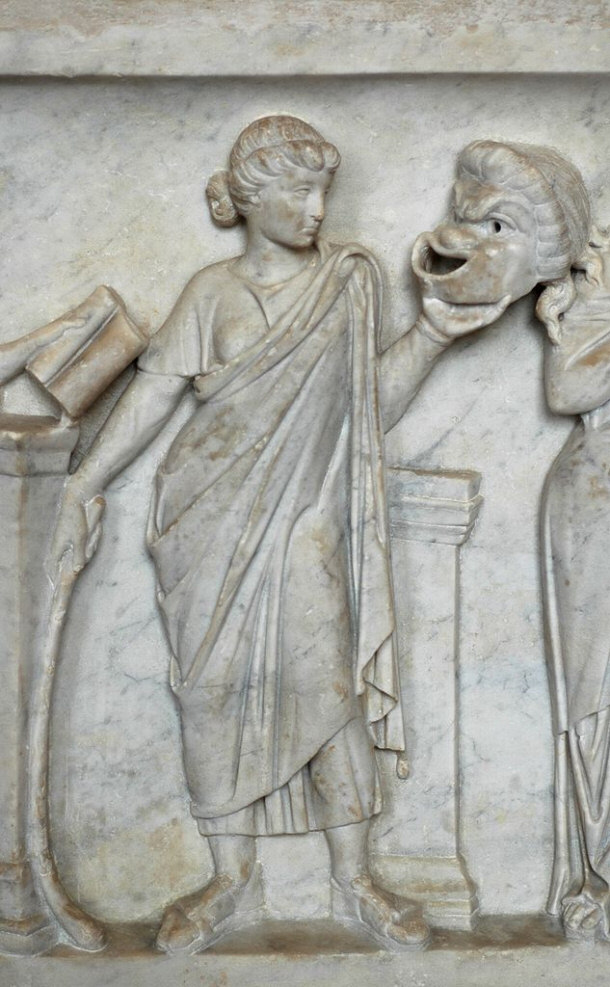
Aristophanes’ parodies and adaptation of works of literature and his
ridiculing of famous political figures gives readers insight about life in
ancient Athens. Readers can infer from his comic criticisms of demagogues such
as Cleon, the flaws of politicians and the general public’s view of these
individuals.
Comic Protagonists
It is important, in any play, to have an excellent
protagonist. Aristophanes was particularly skilled at creating characters that
created rapport with the audience, whilst subtly changing the responders
perception of politics, war and society. For example, the protagonists of The Acharnians and The Knights, both extremely witty, opinionated individuals and
Aristophanes employs persuasive language to characterize both individuals and
convey his political views to the audience.
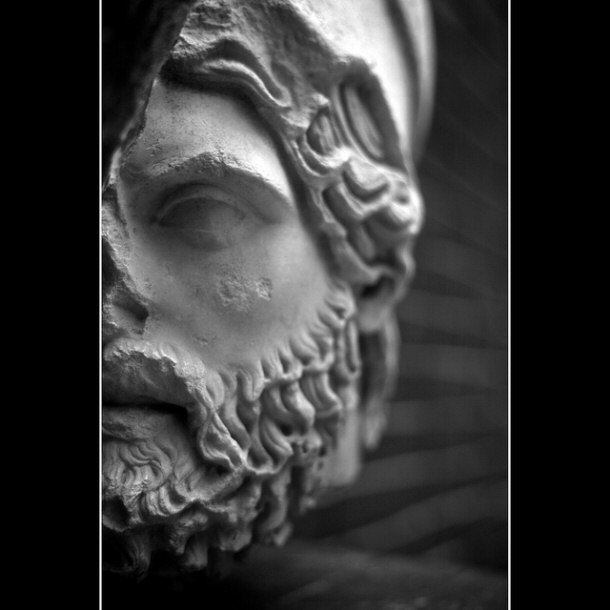
Language and other methods of persuasion utilized by Dikaiopolis and the
Sausage-Seller reveal their intelligence and wily as well as their dexterity as
orators. The Sausage-Seller uses gifts to procure the loyalty of Thepeople
(demos) and surpass his rival, the Paphlagonion (a thinly disguised satirical
depiction of Cleon), as Thepeople’s favourite. His continual proclamation that
“[the Paphlagonion] never gave ‘im one...but now I ‘ave come, and I nah give
[Thepeople] this [tunic]” (p69) espouses his Machiavellian methods of obtaining
power. Similarly, Dikaiopolis uses costumes and a witty comparison between war
and peace to persuade the Acharnians. He dress[es] up to look really wretched
and downtrodden” in order to extract pity from the Acharnians and convince them.
Both characters are extremely manipulative and excel at using the desires and
mistakes of individuals to their advantage as well as exploiting human nature.
Aristophanes uses Dikaiopolis to promote the end of the war and to espouse the
positive attributes of peace whilst he employs the Sausage-Seller reveal his
hatred for Cleon. He rebukes him for prolonging the war and for seducing the
people by his oleaginous and flattery. Thus, the intelligence, manipulative
power and persuasiveness of Dikaiopolis and the Sausage-Seller as well as their
utilization by Aristophanes as a means of expressing his views provide parallels
between both comic characters. The character of the Sausage-Seller is appealing
due to his wittiness, comedic elements and affiliation with the responders. The
clever wordplay utilized by Agoracritus (the Sausage Seller) in the play reveal
his inherent intelligence, despite his low birth. In addition, his continual
comments concerning the Paphlagonion, and thus, Cleon, reveal a more comedic,
perspicacious and quick-witted character than that of Dikaiopolis. The
Paphlagonion’s complaint that the Sausage-Seller had “stolen [his] hare” was
refuted by Agoracritus’ challenge about “oo stole the credit for Pylos” (Cleon
took the credit for the Athenian victory at Pylos). Further, due to his low
birth and basal qualities, he creates rapport with a wide selection of the
audience. Every individual can relate to his lust for power and to his low-brow
humor and self-centeredness. These are merely two examples of the many
intriguing and amusing characters that Aristophanes created as protagonists for
his comedies.
Comic Antagonists
Aristophanes uses the antagonists in his plays to not only
provide an obstacle to their goals, but to also heighten the play’s humor. In
Peace, for example, Hermes contributes to the comedic elements of the play and
serves an important role as an obstacle to Trygaeus’ goal. He also supplies
information about the location of “Peace” (who is personified as a woman)
throughout the play. He tells Trygaeus where her cave is and tells them about
the consequences of retrieving her.
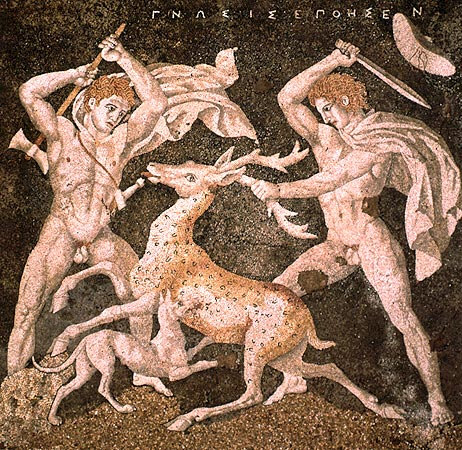
Further, he takes on the role of an informer
to Zeus and, in this passage, begins to call out to him, “O Zeus, wielder of the
thunderbolt --”. However, he is stopped by Trygaeus who begs him to keep his
silence “for the meat’s sake”, thus appealing to Hermes’ conventionally
gluttonous nature and creating an element of comedy. Throughout the play,
Aristophanes employs Hermes to portray some moral concepts to the Athenian
audience. Hermes, the only god to remain on Olympus after it was abandoned by
the other gods, is perhaps utilized by Aristophanes to denote his own notions
that Athens has been reduced to a state of corruption. Aristophanes’ aversion to
war can be linked to the idea that the god of deceit and thievery has allied
with War to rule Greece and to add to the violence that was per-existent within
each city state. Hermes states that the gods were “fed up” with the Greeks and
abandoned Olympus “so they couldn’t either see [them] fighting each other or
hear [them] praying to them”. The cause of a prominent moment of conflict,
Hermes also reveals the corrupt nature of Greek society and helps reinforce the
need for peace.
An Aristophanic antagonist provides an excellent source of comedy throughout
the play as they use elements of bathos to create humor in their comments. In
addition, they should continue to contribute to the success of the scenes in
which they appear in by providing a major challenge for the protagonist to
overcome.
Parody
|
Aristophanes:
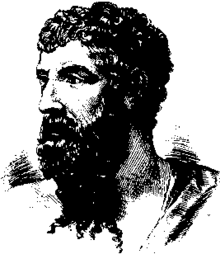
|
Aristophanes’ utilization of tragedy and tragic playwrights is
important to the comic effect of his plays. Despite the fact that it is not
essential for him to include parodies and jokes about tragic poets in order for
the responders to appreciate the humor, Aristophanes intertwines, within his
plays, jests and comic imitations of tragedians. This increases the brilliance
and comical aspects of his works and created rapport with his contemporary
audience.
Aristophanes’ utilization of humorous parodies of tragedies and tragic
playwrights add to the effect of the comedic elements within The Acharnians. In
the brief announcement given by the Third Messenger in lines 1174 to 1190, he
utilities tones intended to satirize that of tragedy. The humor it lends in
creating an intense, dramatic mood as well as exaggeratedly mocking Lamachus’
valiance and misfortune makes it necessary to be included. The messenger’s comic
dramatization of Lamachus as he retells how “he dislocated his ankle, broke his
head upon a stone, and wakened up the Gorgon on his shield, and dropped the
bastard-plume from off his helm upon the rocks, which seeing, he lamented...then
to his feet he rose and stayed his fleeing troops, and then pursued the fleeing
raiders with his trusty spear” adds additional humor to the situation.
(l.1179-1189) Further, the over-exaggerated and tragic tones employed by the
messenger provide more of a contrast between the entrances of Lamachus and
Dikaiopolis. Lamachus arrives after this melodramatic, lugubrious monologue,
battle weary and wounded whilst Dikaiopolis enters drunk with a courtesan on
each arm. These juxtaposing entrances portray to the responders Aristophanes’
desire to end the war in favor of a peaceful state.
Role of the Chorus
The entry of the chorus in classical Greek comedy was a
sudden introduction of movement and spectacle, intended to captivate the
audience. The chorus almost moved as a single unit, every movement choreographed
so that the patterns and swirling motions of their dances would be visible even
in the highest rows of seats in the theater.
Theatrical Masks of Tragedy (left) and Comedy

The chorus would be dressed in
special, bright costumes perhaps with large props to make the spectacle even
more eye catching. It was not there to merely dance, however, but also to
comment upon and play a large part in the action in the scene. The name of
Aristophanes’ plays are most often derived from the chorus (such as The Wasps or
The Knights), denoting their importance in the overall production. Choral odes
are often in juxtaposition with the dialogue of the play’s protagonists, adding
another element of humor and entertainment. Further, Aristophanes (and other
classical comic poets) used the chorus and its leader to denote his message
throughout the play. The poet’s political views and advice is usually conveyed
in the play’s parabasis (a monologue of sorts, usually delivered by the leader
of the chorus), whilst the comic poet’s mocking of his competitors and public
individuals is scattered throughout the play. The chorus can also introduce
additional humor through their witty and often rude songs and dances, as well as
their costumes.
History
Top Lists:
15 Biggest Architectural Blunders
Top 15 Most Horrifying Terrorist Attacks
15 Fascinating Facts About the Vietnam War
Top 15 Amazing Ancient Egyptian Architecture
20 Little Known Facts About the Titanic
Top 10 Most Creepiest Abandoned Places in the World
26 Interesting Facts About Henry Ford
List of 15 Tough Ancient Warriors Through History
List of 15 Notorious Roman Emperors and Empresses
Top 15 Worst Pandemics in History
15 Things That Remained the Same in the Past 100 Years
Top 15 Things China Invented First
Top 15 Greatest Inventors in History
15 Interesting Facts About Abraham Lincoln
10 Inventors Who Stole Their Ideas
15 Stories of Hilarious Medieval Victories
15 Detectives Credited With Solving The Biggest Cases In History
15 Fascinating Facts About the Ancient Pyramids
15 Inventions That Were the Result of a Mistake
15 Famous Stories of Execution
16 Rare Facts About the U.S. Presidency
15 Astonishing Leadership Stories that Ended up Successfully
Informational:
Analysis of the Linear B tablets and Wall Paintings
Aristophanes and Classical Greek Comedy
The First War of Scottish Independence
|